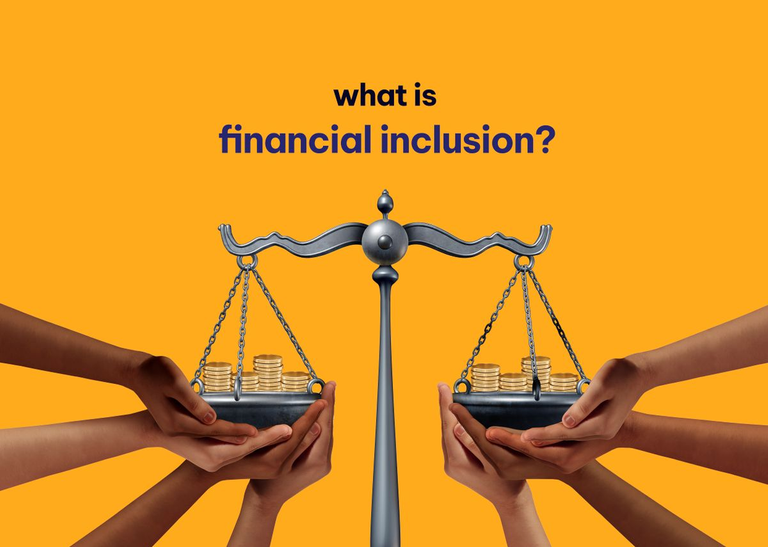Exploring the Correlation between Financial Inclusion and Cryptocurrency
Cryptocurrency financial inclusion refers to the idea that cryptocurrencies can help provide access to financial services for people who are currently excluded from traditional banking systems. In recent years, cryptocurrencies have emerged as a disruptive force in the financial landscape, promising increased financial access and empowerment.
In many parts of the world, especially in developing countries, a significant portion of the population does not have access to basic financial services like bank accounts, loans, and payment systems. This lack of access can limit their ability to save money, receive payments, or participate in economic activities


Cryptocurrencies, such as HIVE or Leo, operate on decentralized digital platforms called blockchains. These digital currencies can be sent and received globally, without the need for intermediaries like banks. This flexibility of cryptocurrencies opens up new possibilities for financial inclusion
This article aims to examine the correlation between financial inclusion and cryptocurrencies and shed light on their potential impact on underserved populations.
Accessibility: Cryptocurrencies can provide financial services to unbanked and underbanked populations who lack access to traditional banking systems. All that is needed is a smartphone and an internet connection, enabling individuals to transact, save, and invest without relying on institutions.
Cross-Border Transactions: Cryptocurrencies have the potential to facilitate cross-border transactions at lower costs compared to traditional methods. This can benefit workers who often face high fees and limited access to financial services when sending money to their families in their home countries.
Microtransactions : Cryptocurrencies can enable microtransactions, allowing individuals to make small payments and engage in economic activities that were previously impractical due to high transaction fees. Moreover, cryptocurrencies can streamline remittance processes, making it faster and more affordable for individuals to send money across borders.

Financial Empowerment: By leveraging cryptocurrencies, individuals can have greater control over their finances. They can store value, access credit, and participate in peer-to-peer lending and crowdfunding platforms without the need for intermediaries. This empowerment can help uplift financially marginalized communities and foster entrepreneurship.
Challenges and Considerations:
Technological Barriers: While cryptocurrencies offer financial inclusion possibilities, it's important to address the technological barriers that may hinder their adoption among underserved populations. Access to smartphones, reliable internet, and digital literacy are key prerequisites for leveraging cryptocurrencies effectively.
Regulatory Environment: The lack of clear regulations and legal frameworks around cryptocurrencies may hinder their widespread adoption. like what is happening in Nigeria.
Financial Risk: Cryptocurrencies are known for their price volatility, which can pose financial risks, particularly for vulnerable populations. Efforts are needed to educate individuals on the risks associated with investing in cryptocurrencies and promote responsible financial behavior.
Privacy and Security: While cryptocurrencies offer privacy benefits, they also present security concerns. Education and user-friendly security measures should be prioritized to protect users from fraud, hacking, and other cybersecurity risks.
Moreover, cryptocurrencies can empower entrepreneurs in developing economies. Access to capital is crucial for small business owners to start and grow their ventures. However, traditional banking systems often impose high collateral requirements and extensive paperwork, making it challenging for entrepreneurs, especially in emerging markets, to obtain loans. Cryptocurrencies, with their decentralized lending platforms and crowdfunding mechanisms, offer alternative ways for entrepreneurs to access funding and realize their business ideas.
Cryptocurrencies have the potential to play a significant role in advancing financial inclusion globally. By offering accessibility, lower transaction costs, and financial empowerment, cryptocurrencies can contribute to bridging the gap for underserved populations. However, to realize this potential, it is crucial to address technological barriers, establish clear regulations, manage risks, and prioritize user education. By doing so, we can harness the transformative power of cryptocurrencies and drive positive change in financial inclusion worldwide.


Congratulations @tmicezack! You have completed the following achievement on the Hive blockchain And have been rewarded with New badge(s)
Your next target is to reach 20 posts.
You can view your badges on your board and compare yourself to others in the Ranking
If you no longer want to receive notifications, reply to this comment with the word
STOPTo support your work, I also upvoted your post!
Check out our last posts:
Support the HiveBuzz project. Vote for our proposal!